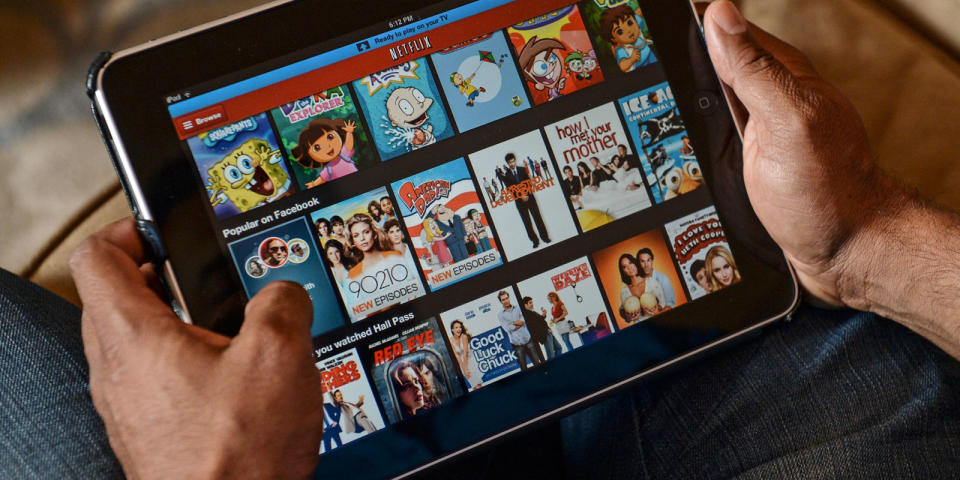Netflix has a problem promoting its content
Netflix (NFLX) has a content problem, although not the content problem you think.
The popular streaming service, which announced Wednesday it had signed “American Horror Story” producer Ryan Murphy to a multiyear, multimillion dollar deal to exclusively create content for it, now faces a problem unique to its aggressive business model: too much content and not enough room for that content to succeed as it should.
Earlier this month, Netflix made a huge marketing push for “Altered Carbon,” a futuristic, “Blade Runner”-esque 10-episode series that may have cost over $7 million an episode based on some outside estimates. But just two days after the costly show premiered, Netflix essentially thwarted any promotional momentum the show had built up by revealing a new original film called “The Cloverfield Paradox” during Super Bowl LII. The publicity stunt worked and spurred a ton of chatter on social media and quick-hit movie reviews. But it also highlighted the real problem Netflix now has with the model of incessant content production it pioneered: by releasing and promoting its sci-fi flick the way it did, Netflix cannibalized users’ attention away from its just-announced sci-fi show.
“Netflix has been great at developing a lot of content, but what it hasn’t been great at is the traditional, Hollywood style of marketing and creating enough buzz around shows,” explains Omar Akhtar, an analyst for the San Francisco-based Altimeter Group. “That’s not where their budgets lie. They’d rather spend on great content.”
Improving quality control

Indeed, that’s why traditional film studios don’t usually release more than one film on the same weekend: They don’t want to shoot themselves in the foot by forcing people to choose — a tactic that could hurt the film studios’ revenue.
The streaming service could also get better at picking the content they should produce, not to mention killing content that’s underperforming. Last year, Netflix got more aggressive with canceling shows that weren’t well received. After only one season it canceled “Girlboss” and “Gypsy.”
“I think they can do a bit better in terms of quality-control and what they think is going to test well,” adds Akhtar. “They’ve got a ton of data available to them.”
Netflix said it does use data-driven tactics to figure out what users watch and which kinds of content it should produce.
The company hasn’t revealed what “Altered Carbon’s” viewership looks like so far, however, it may have to settle for a slow burn, with users discovering and tuning into the show over a longer stretch of time rather than having an instant hit on its hands. But in terms of having a chance to linger in the public consciousness in any significant way — the same way a new theatrical film release generates opening-weekend buzz and ultimately, creates an ongoing conversation through social media, news and word-of-mouth — “Altered Carbon” never got that chance. Instead, Netflix may have inadvertently sacrificed a potentially good series for a Super Bowl marketing gimmick hawking a film that received a 18% “Rotten” rating on Rotten Tomatoes.
Netflix’s problem may only worsen as it signs more top-tier Hollywood talent like Murphy. The 52-year-old producer of shows such as “Glee” and the “American Crime Story” anthology, follows in the footstep of “Scandal” creator Shonda Rhimes, who announced last August that she too was leaving traditional network television to create original content for Netflix.
“The brand of Netflix is just creativity,” Rhimes told Yahoo Finance in November. “And that’s exciting: the idea that I get to write in whatever manner I want to write, in whatever form I want to write because I want to write it.”
In need of a fresh update?

That may be true, but making that original content stand out is compounded by Netflix’s cluttered user interface. Although Netflix now parses out its original series and films in a category of its own, navigating Netflix’s entire catalog on your TV, computer or smartphone can be an overwhelming experience. It also doesn’t help that the streaming service doesn’t offer trailers for every show and movie in its catalog by default — one of the few areas where Amazon’s (AMZN) streaming service has a leg up. (Netflix offers trailers for some of its original content, but it’s more an exception than the rule.)
“Netflix needs a fresh update,” Akhtar contends. “The way we usually experience movies is not by looking through a virtual catalog. For the most part, Netflix trailers are not a thing unless it’s a big marquee release like ‘Stranger Things.’ In the long turn, I’d like to see more trailers within Netflix. There isn’t enough of that.”
Netflix wants to eventually become a single virtual TV platform replacing the need for traditional network TV. And while there are certainly more people cutting the cord these days, Netflix fully replacing network TV isn’t going to happen in the short-to-medium term, if ever, thanks to growing competition from competitors like Hulu and Amazon, not to mention traditional TV networks like CBS, which continue to experiment with streaming services and online original content of their own.
In addition to spending billions on top producers, Netflix should focus on developing and promoting its content, giving them the space and attention they deserve. That would be a win, not just for Netflix, but content producers and viewers, too.
—
JP Mangalindan is the Chief Tech Correspondent for Yahoo Finance covering the intersection of tech and business. Email story tips and musings to [email protected]. Follow him on Twitter or Facebook.
More from JP:
Facebook’s ‘Downvote’ is the closest we’ll ever get to a Dislike button
African American and Hispanic tech workers still earn less than their white counterparts
Tech salaries in LA and Austin are catching up with Silicon Valley
Analyst: Apple Music still has huge, untapped market potential
Instacart CEO: Voice recognition is coming in the next 12 months
Follow Yahoo Finance on Facebook, Twitter, Instagram, and LinkedIn
